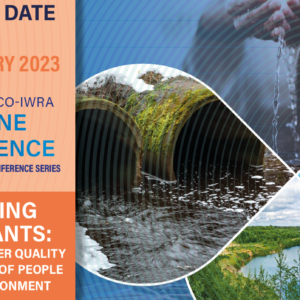The International Water Resources Association (IWRA) is coordinating and contributing to sessions during the UN-WATER Summit on Groundwater in Paris, France that will take place from December 7th to December 8th, 2022.
Find out more on all these sessions below and don’t forget to pencil them in your calendar.
DETAILS FOR IWRA COORDINATED SIDE-EVENTS
Big Earth Data in Support of Groundwater Sustainable Management | Tuesday, 6th December, 9:30 – 10:30 AM CET
Session organisers: International Research Center of Big Data for Sustainable Development Goals; Capital Normal University
Speakers:
- Shanlong Lu, Moderator, International Research Center of Big Data for Sustainable Development Goals, Associate Professor, International Coordinator of SDG 6
- Yun Pan, Moderator, Capital Normal University, Professor
- Huadong Guo, Speaker, International Research Center of Big Data for Sustainable Development Goals, Professor
- Abou Amani, Speaker, UNESCO Division of Water Sciences and Secretary of the Intergovernmental Hydrological Programme (IHP), Director
- James Famiglietti, Speaker, Global Institute for Water Security, Executive Director
- Yuanyuan LI, Speaker, International Water Resources Association, President
- Chunmiao Zheng, Speaker, Southern University of Science and Technology (Shenzhen, China), Professor
- Claudia Ruz Vargas, Speaker, IGRAC, Groundwater Specialist
- Xuesong Shen, Speaker, Chinese Permanent Delegation to UNESCO, Minister Counsellor
Session Description
- Data and tools are key for the evaluation of groundwater sustainability as well as the implement of management practices. Emerging techniques such as remote sensing, advanced modelling, and machine learning, have shown a good potential in making invisible groundwater visible. This side event will focus on use of big earth data such as satellites, in-situ observations, and models for monitoring and evaluation of groundwater sustainability at multiple scales, towards in support of management practices. Application cases and experiences geography locations with different concerns will be presented and discussed.
Adaptation and flexibility in the context of groundwater governance and the SDGs – the case of food security | Tuesday, 6th December, 14:00 – 15:00 PM CET
Session organisers: IWRA, UNDP/UNDP-SIWI Water Governance Facility, IW:LEARN and the MoFA, Slovenia
Speakers:
-
- Anita Milman, Overview of session, Co-Chair the of IWRA Groundwater Task Force
- Carole Dalin, Primer: Groundwater, Food, Trade, École normale supérieure (France) and University College London (UK), Associate Professor
- Raya Stephan, Moderator, Water law expert/Deputy Editor in Chief Water International, Consultant
- François Bertone, Panelist, World Bank, Senior Water Resource Management Specialist
- Shilp Verma, Panelist, International Water Management Institute (IWMI), Senior Researcher, Water-Energy-Food Policies
- Eduardo Zegarra, Panelists, Group for the Analysis of Development (GRADE), Senior Researcher
- Henning Bjornlund, Synthesis and Conclusion, UniSA/IWRA, Research Professor in Water Policy and Management
- Renée Martin-Nagle, Rapporteur, CEO of A Ripple Effect, Treasurer of IWRA
Session Description
- Agriculture accounts for 70% of total groundwater withdrawals. Water use for agricultural production has both local and global implications. While global demand for food is steadily increasing, intensive and unsustainable agricultural practices can lead to pollution and depletion of aquifers. Thus, the wise governance of groundwater is needed to ensure water and food security across many scales. This side event will discuss how to best approach the question of groundwater governance for food security, in the context of global climate change and socio-economic turbulence.
DETAILS FOR IWRA COORDINATED SESSION
Governance: Groundwater and Acceleration Instrument for SDG6 | Wednesday, 7th December, 17:30 – 18:30 PM CET
Session coordinators: UNDP – SIWI, IWRA, UNESCO, GEF IW-LEARN, Ministry of Foreign Affairs of Slovenia
Speakers:
- Karen Grothe Villholth, Moderator, Water Cycle Innovation, Director
- Jenny Grönwall, Rapporteur, Stockholm International Water Institute (SIWI), Advisor Water Policy & Rights
- Sabina Khatri, Rapporteur, UNU-FLORES, MoEWRI, RWSN, GWYN, Visiting Scholar, Hydrogeologist
- Tanja Miškova, Opening Address, Ministry of Foreign Affairs, Slovenia, Ambassador-at-Large for Water Diplomacy
- Raya Stephan, Overview Presentation, Water law expert/Deputy Editor in Chief Water International, Consultant
- Eric Tardieu, Panelist, International Network of Basin Organizations (INBO), Secretary General
- Joanna Doummar, Panelist, American University of Beirut- International Association of Hydrogeologists, Associate Professor of Groundwater Hydrology- Vice president MENA (IAH)
- Olcay Unver, Panelist, Arizona State University, Professor of Practice
- Yuanyuan LI, Panelist, International Water Resources Association, President
- Callist Tindimugaya, Reflections by practitioner, Ministry of Water and Environment Uganda, Uganda Commissioner for Water Resources Planning and Regulation
- Barbara Pompili, Statements by invited speakers, Former French Minister for Ecological Transition, Chair of the OECD Water Governance Initiative, Member of the National Assembly of France
- Nigel Crawhall, Statements by invited speakers, UNESCO, Chief of Section
Session Description
-
Groundwater governance is about the decision-making processes, law and policy, conditions and enabling environment that determine who gets what water, how, where, and when. Governance sets critical frames for groundwater management, planning, and policy implementation, and takes aim at the decision-making practices and outcomes at multiple levels of the administration.
Governance takes place at different, partially overlapping levels. It is concerned with the regulatory framework of formal rules, principles for decision-making, instrumental steering of the relationship between government and line ministries, incentives for cross-sectoral collaboration, the conditions for financing, data collection and sharing, and the link and nexus with other sectoral policies that govern utilisation of groundwater. At the regional and local level, groundwater governance comprises specific arrangements that are devised, usually between the different users and local authorities, at the aquifer or basin scale, including social norms and local practices.
The rule of law and other governance principles are, alongside institutional arrangements, the cornerstones that support and create opportunities for steering, action, and transformation. Groundwater governance is challenging due to several interlinked and somewhat overlapping factors. It is partially because of the open access-nature and direct use of most underground resources.
The session will explore gains, gaps and challenges from a groundwater governance perspective on acceleration of SDG 6. How can improved cross-sectoral governance – at multiple levels including the very local – better value groundwater resources and aquifers? What coordination measures are necessary; how can better alignment be-tween formal governance arrangements and informal elements be fostered? How can regulatory frameworks be improved?
For any questions, please send an email to: office@iwra.org.
Groundwater is invisible, and yet its impact is visible everywhere. It is a hidden treasure that enriches our lives. Groundwater may be out of sight, but it must not be out of mind.
The UN-Water Summit on Groundwater 2022 aims to bring attention to groundwater at the highest international level. The Summit will use the UN World Water Development Report 2022 as a baseline and the SDG 6 Global Acceleration Framework as a guideline to define actions towards more responsible and sustainable use and protection of this vital natural resource.





